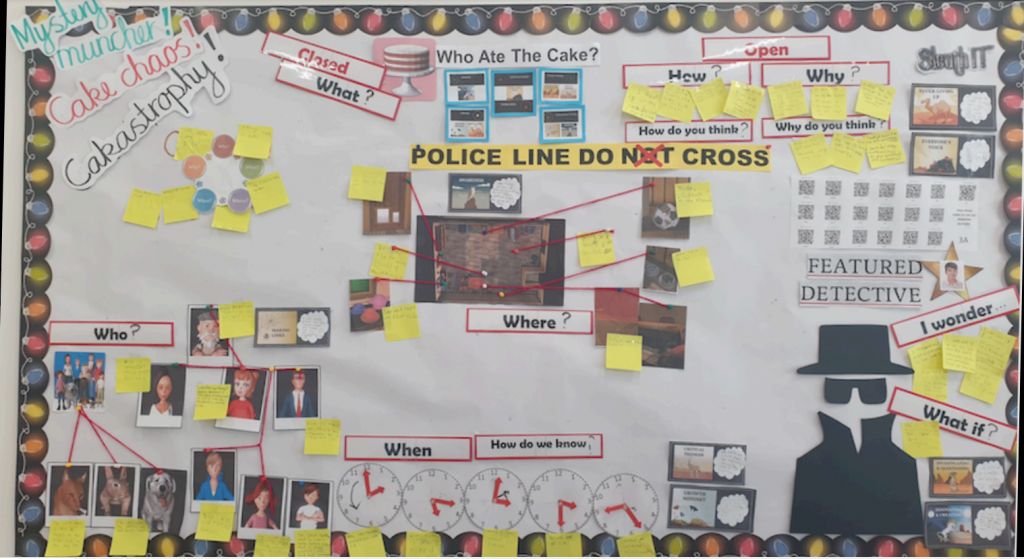
SleuthIT brings together different genres. Players can follow in the footsteps of Sherlock Holmes to solve a mystery, experience the intricacies and interaction of an escape room and enjoy the inquiry and inference elements of a strategy game such as Cluedo.
We know that engaging students, especially boys of primary school age, with text, with reading and creative writing can be extraordinarily hard work. SleuthIT could turn out to be the missing piece of the puzzle.
Are video games a creative route to literacy?
There is a wealth of evidence to show that video games impact reading:
- We found that 4 in 5 (79%) young people who play video games read materials relating to video games regularly, including in-game communications (40%), reviews and blogs (31%), books (22%) and fan fiction (19%)
- A third (35%) also believe that playing video games makes them better readers. As one young person said: 'Books help grow your imagination and so do games, because of all the things you can do'
- Three-quarters (76%) of young people talk to their friends about video games compared with only 3 in 10 (29%) who discuss books. In addition, young people said that playing video games helps them to build social connections both ‘in real life’ and online, and maintain relationships with friends and family. One young person said: “Video games help me stay in touch with my cousin as he lives hundreds of miles away”
- Boys were much more likely to play video games than girls (96% vs 65%)
- Nearly twice as many boys as girls said they chatted with family and friends as part of playing a video game during lockdown (71% vs 40%)
- Video games were also found to be effective at engaging reluctant readers with stories, as 3 in 4 (73%) young people who don’t enjoy reading said playing video games helps them feel more part of a story than reading a book-based text
Research by the National Literacy Trust in 2020
SleuthIT 's genesis
There are currently 11 games plus two new releases scheduled for imminent release. They are the fruit of collaboration between Joe and his wife Fi. They are both keen on murder mysteries, so I asked about their influences, Are they devotees of the Golden Age or of modern fast paced adventures? He describes himself as a, 'huge Agatha Christie fan, but Fi and I like any murder mystery which has a good plot line and makes you think!’
Fi writes all the scripts and the narrative. Joe describes her process as being like three-dimensional chess: 'That's what actually a good whodunit is. You've got to cover all the bases and look at all the information to come to a logical conclusion. It is important to us that no player feels cheated at the end of the game.'
Joe is in charge of the graphics. He said it started almost as a hobby as he has always been interested in 3D graphics and avatars but attributes the stunning graphics to, 'many hundreds of hours of upskilling.'

Now in 20 countries including UEA, Iceland and Norway, the success of SleuthIT also owes much to adventure films such as Indiana Jones. Games are constructed in episodic chapters, but the breadcrumb trail of clues comes in many forms: a video clip to watch, some written clues, a range of multimedia interactive elements to explore, and tasks to complete.
Take episode two from The Case Of The Mummy's Curse. Set in Egypt 1926, where a tomb has been discovered, we meet Doctor Septimus Spindle and discover his briefcase with a combination lock in an interactive 360 degree panoramic. A more extensive search of the area reveals the doctor’s journal and all the clues required to open the briefcase. It is exciting, visually stimulating and above all interactive, and participants have to engage to move on.
SleuthIT can be accessed from iPad, Android tablet, Windows Surface, Chromebook and Windows and Apple devices. The games run in a browser and are accessed via a URL link with a 6 digit login for each episode with no GDPR issues or student logins or signup required. Through the episode log in teachers can control the progress to each episode as and when required so it can be used as a series of lessons over several weeks, as a theme for a summer school or as a whole day event.
Impact on literacy skills
SleuthIT involves reading and rereading that will involve skimming and scanning, checking for meaning, close reading looking for clues. It is reading for a purpose and will improve oracy and communication skills.
It also offers a wonderful natural way of raising the level of vocabulary, introducing more literary language. The Case of the Mummy's Curse uses words such as: sneaked, fever, gravely ill, expertise, acquainted, spluttering, roused, enthusiast, significant, assistance and hieroglyphics. All these occur in under four minutes of dialogue. Learners see and hear the words and have a context which will help them to remember and use the word appropriately.
As students collaborate and piece together the clues, they are discussing rather than competing, scaffolding arguments, revising and revisiting the evidence. They might work together on all tasks or delegate so they may arrive at conclusions via different routes.
SleuthIT allows for differentiation through a range of elements. All games include video, and all videos have subtitles, images, interactive panoramics and widgets where clues and evidence can be discovered and explored. Read-to-me versions of the texts to support students with the reading if required. This ensures that early readers, students needing additional support, or whose first language is not English will experience the same adventure as their classmates, with scaffolded learning tailored to their abilities.
SleuthIT's format encourages critical thinking and problem solving. One player said: 'The interactive settings were fun to explore and made us feel like real detectives searching for any stone we may have left unturned! One of the elements I enjoyed was finding scraps of paper that you had to piece together like a jigsaw puzzle.'
Building curriculum knowledge
There are games for children aged 6-18 and many have links to other subjects. These include A Riddle of Rome, The Case of the Mummy’s Curse, motor racing in Death Comes to Donnington, the environment in The Time Machine and the galaxy in Solar where students must track Spaceship Icarus to the outer reaches of the solar system and find out why it deviated from its route.
Shakespeare texts such as Macbeth, Midsummer Night's Dream, Othello, Twelfth Night, Hamlet and Romeo and Juliet figure in The Mystery of Shakespeare's Globe. We are told: 'A mystery chest has appeared on the stage just before a performance, with a note claiming it contains the body of Mr Shakespeare himself. You/your students will have to take a closer look at Elizabethan theatre and the day-to-day workings of the Globe, together with six of the bard’s own plays, to try and determine how the chest came there, who it contains, and why.'
A SleuthIT title can provide a whole term's work. As well as the games all titles are supported with resources and documents. There are quiz reviews for each episode with a variety of challenges and exercises. There is also an extensive detective journal which can be in excess of 100 pages with learning activities related to the case. This can extend the gameplay into a structured lesson by lesson process. This can be made available in book creator, keynote, PowerPoint, Google Slides and PDF formats as required.
There is a further set of classroom projects on the website with supporting templates for free download to extend the learning activities such as reading a graphic novel, comic book creation, writing articles for a newspaper green screen activities and creative writing challenges.
It's not just fun and games
Ross Brown teaches at Stenhouse Muir Primary School in Falkirk. Last year he was teaching primary 6 when they had just been allocated iPads for every child in his class. Joe Moretti was in the school in his role as an Apple Trainer, showing them a range of apps for the iPads. He introduced them to the SleuthIT mystery The Master Chef and helped them to work through the first episode.

The plot is simple: 'Gourmet Chef of the World is one of catering’s most prestigious competitions, but one of this year’s competitors is unlikely to be taking home the top prize, as someone’s offering appears to have literally poisoned the judge! Your students will have to examine the contestants and their recipes to determine exactly what – or who – is responsible.'
'We were hooked,' said Ross. 'We have so many initiatives and sometimes we don't get past the first hour but the class loved this because it was like a computer game plus Cluedo. Joe presented it beautifully. He told them they were to act like detectives. I had some children who struggled with literacy but this was not a barrier. There's a lot of audio as well as text and Joe had suggested we split the class into mixed ability groups, so those who struggled would be working alongside a strong reader and that helped. If anyone wanted to go solo, they could do and so there were several different ways of working going on in the class.
It really took off. We had an evidence board like you see in all the crime programmes on TV so it became much more real. Two of the boys in that class didn't enjoy reading at all. They wouldn't read a physical book and they weren't really interested in literacy. But they wanted to be involved in every aspect of the game, gathering evidence and weighing up the clues. I had to pull them back and say, you can't work on that all day.
I think it attracted a lot of interest. We are now going to try it out with groups lower down the school.'
You can learn more about Sleuth IT at https://www.gamification4education.com/ . Their app is available on App Store for iPads and also on Google Play for Android tablets. Follow Joe on Twitter.